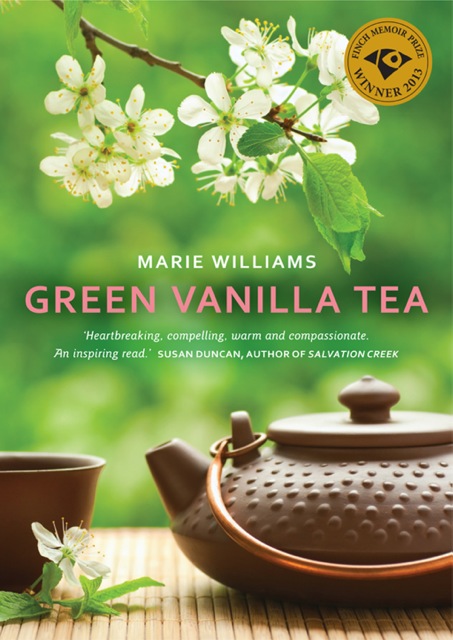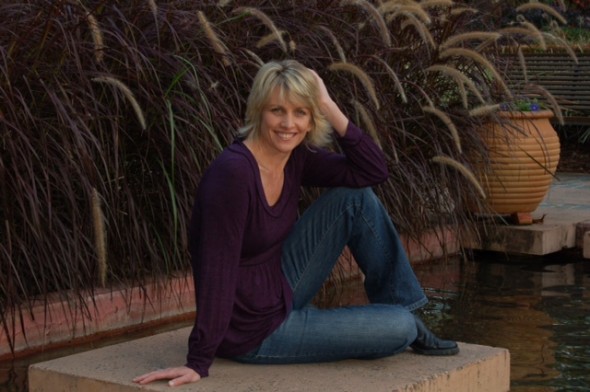
Interview with Green Vanilla Tea author Marie Williams
Award-winning South African author Marie Williams talks exclusively to SAPeople about love, loss, Green Goblins and discovering what makes your heart sing. Marie was recently awarded the Finch Memoir prize in Australia for GREEN VANILLA TEA, a heart-wrenching and inspiring memoir of the loss of her husband Dom, a fellow South African. The two had […]

Award-winning South African author Marie Williams talks exclusively to SAPeople about love, loss, Green Goblins and discovering what makes your heart sing.
Marie was recently awarded the Finch Memoir prize in Australia for GREEN VANILLA TEA, a heart-wrenching and inspiring memoir of the loss of her husband Dom, a fellow South African. The two had met in their youth, and lived in America and Canada before settling in Australia. They were soul-mates with two beautiful teenage sons…when tragedy struck and Dom was diagnosed with a terminal illness.
In a story filled with heartache, hope and humour, Marie writes about the family’s journey through the unfamiliar territory of a terminal illness. Ultimately, it is a love story.
 1. When did you move to Australia and why?
1. When did you move to Australia and why?
We moved to Australia from Canada in 2000. It was a quality of life decision really – Dom was offered an academic position here that meant less work travel and more time at home with family.
2. Before your husband’s illness, had you considered becoming a writer?
Not really, although I grew up in a house filled with books and have a dad who is a wonderful storyteller. I’d often dreamed of writing and illustrating children’s books.
When we arrived in Australia, I signed up for part time classes at an art school, however I wasn’t there for long before Dom became ill and I withdrew.
3. I believe you wrote your book for your sons. What made you decide to share it publically, to publish it?
Yes, I initially wrote Green Vanilla Tea for the boys after Dom died. So much of what they experienced felt invisible, slippery and without words. They asked me to write about it, to ‘try and capture it somehow’ and ‘give the story form.’ Now, I cannot write someone else’s story so my writing became a launching pad for rich conversations with the boys. We talked through every evolving chapter, giving the story voice and this family act of story telling became their book!
What made us decide to publish? Short version: at some point, a couple of years after the manuscript was finished, I asked the boys, ‘if you had read something like this when dad was sick would it have helped?’ They both said yes, without pause. So with their consent, I posted it off.
4. What do you think were three key elements that enabled you to keep going and complete your book?
To be honest, my writing was a spontaneous response to grief and I wrote because I couldn’t not write. I didn’t struggle to complete this book. I wrote and wrote and wrote.
 On reflection, there were some key influencing factors. These are the three that seem most prominent.
On reflection, there were some key influencing factors. These are the three that seem most prominent.
- I knew that over time, people would come into the boys’ lives never having known their dad or been witness to this period of their life. They had asked me to write about it and given their request, I wanted this story to be the best version of itself it could be – for the boys to have a treasure they could share with their own families one day. (I remember Nic coming through to me in my bedroom one evening, holding one of the earlier drafts of Green Vanilla Tea. I have such a strong visual memory of this. He leaned against the doorframe and I remember noticing how much space he took up in the doorway. My little Nic; who was so young and small when this story all began, was now so big and tall. It was a striking reminder that this illness had spanned so much of their teenage lives. Anyway, Nic said, “Thanks Mom – I think this is the most powerful gift I will be able to share with my life partner one day.” I remember leaning back against the pillows on my bed and thinking, wow; we did it, my job is done!)
- I remember the day I sat on the rug in our living room floor, holding the boys and telling them that their dad had dementia with motor neurone disease and was dying. I remember the question, ‘what happens if I can’t remember what dad was like before he got sick?’ As the illness (that we came to know as the green goblin) had Dom drifting away, I became determined to find a way to hold onto his stories in a way that could reconnect us to the dad and husband we loved so dearly. We are all multi-storied beings but when we get sick, it’s so easy for the many personal stories of our lives to be lost in stories of illness or disability that profile deficits. The problem is that when these more dispossessing storylines become definitive, definitive in the sense that this is how we come to know ourselves or how others know us, it leaves very little room for the rest of us to be seen. Dom was at risk of being flattened into a single story of disappearance – you know – the man that is no longer there. If this was the only story told about him, it would leave little room for the question – I wonder what kind of man he must be to gather so much love around him in these difficult times? The answer to this question would elicit a whole new set of co-existing stories. So writing became a tangible way to make room for more of Dom to be seen. In a way, writing (and the quilt we made) became an act of advocacy as well as love.
- The boys talked with me about experiences they had with friends that left them feeling like they were living inside an invisible story. I understood that because, outside the world of medical language that explains symptoms and treatment, there is no everyday language or framework readily available to help people understand the social impact of this illness (and other ‘invisibility’ illnesses) on a young family with teens. In our case, there were no books or movies, no coloured ribbons or awareness campaigns, there were no resources or services for young people, no social signifiers of any kind. And without social signifiers, where does the experience go? It is rendered invisible. No wonder the boys felt like they did. There was absolutely nothing to hang their story on. It was as if the words they used to tell our story simply fluttered to the ground, to be blown away by the wind. It felt important to give this story voice, and ‘to capture it somehow and give it form.’
5. Since ‘Green Vanilla Tea’ has been published, it’s been so warmly received and won the 2013 Finch Memoir Prize. Is this another life-changing experience for you? And what has been the biggest surprise in all that you’ve gone through since winning this prize?
Never did we imagine this family story would be acknowledged with an award. Has this been a life changing experience? In some ways nothing much has changed. In other ways, everything has changed – all at the same time. My daily routine remains the same – you know – walking the dog, paying the bills, folding crinkled laundry. But when I think back to the origins of this story, I am so grateful for what this award has made possible. It is a profound affirmation of a once wordless tale and it has given us the opportunity to set this story free to make a contribution in the world. What a wonderful outcome.
I’ve been asked – what’s next for you? I’m not sure really, I recently resigned from my job, feeling the need to pause. I’m at a crossroads in my career – perhaps I am a woman in the process of reinvention!

6. So much of your success in life has been because you choose to live in the moment. Have you always been like that, or was there an event that made you become like that?
I can think of several stories that have shaped the way I try to live my life, including our journey with Dom. Life was stripped of all its irrelevancies and we were left with what mattered. I think I say in the book that in the process of Dom’s dying, I became so much clearer about what brings life.
7. Who are your favourite writers? Who inspires you?
I don’t have a favourite genre or author – although I do enjoy historical fiction. I s’pose what I look for in a book is to be transported somehow; that’s what stories make possible. They provide portholes into worlds we might otherwise never get to travel, they invite empathy and understanding, we get the chance to see ourselves reflected in the stories of others and, as I hope is the case with Green Vanilla Tea, they speak to some of the universal stories of humanity we all share. Then of course there are books that are filled with pure imagination and whimsy – those are wonderful too.
8. What’s your idea of a perfect Sunday?
Whatever feels good on the day! A walk on the beach or somewhere out in nature, tea with family and friends, an afternoon snooze, curling up with a good book and splashing paint onto canvas.
9. Who has been the most interesting person you’ve ever met? And what did you learn from them?
I can’t pick one person – I’ve learned so much from so many. Everyone has a story, it’s what makes life so interesting.
10. What one thing did you learn about human nature during your years as a social worker?
Love and belonging are an integral part of the human experience. Some experience it, some seek it, and there are many things that get in the way. But it knows no boundaries; in some way, love and belonging are important in all of our lives.
11. How do you handle the tough times? How do you keep going when things may not be going your way?
I am a believer that people bring with them, any number of personal resources, strengths and intentions to difficulties they face. One of my resources is creativity. So many of the things that sustained me during Dominic’s illness and after his death are wrapped up in the making of a story-telling quilt, the writing of this book and painting. Creativity provided me a platform for meaning making, it supported us as fierce advocates of Dom’s dignity, it gave us a way to change the shape of hope and do hope together, it became a tangible expression of love… I guess I tapped into the power of creativity to transform.
12. Please finish these sentences:
a) I love being South African because….
I was born in Zimbabwe, grew up in South Africa, currently live in Australia, have lived in Canada and America, once had a green card, have Canadian, British and Australian citizenship…I’m a real mix of everything. I see myself as a citizen of the world, living out my values wherever I find myself. Sometimes I long for a clearer sense of home or place. I imagine this is a common experience for immigrant families; we tend to carry rich yet invisible stories on our journeys. And yet, my life has been so enriched by the different places I have lived.
c) Love is…
Oh, this is a very big question. I’m not sure it is answerable in a measurable kind of way. I have always liked Kahlil Gibran’s poetry on love. It captures the fullness of love in all its, sometimes paradoxical, manifestations.
d) Success is…
I rather like Albert Einstein’s take on this. “Try not to become a man of success. Rather become a man of value.” And I would add – discovering what makes your heart sing; what makes you come alive, and doing that.
e) One day I’m going to…
walk the Camino in Spain
THE SHOUT OUT:
Website: www.mariewilliams.com.au
Green Vanilla Tea is available from bookshops nationwide in Australia including independent bookshops. To find an independent bookshop near you, go to http://www.indies.com.au
Online retailers:
You can purchase Green Vanilla Tea online through the following retailers: Booktopia and Constant Reader. They ship locally and overseas.
You can also buy it as an eBook from:
Amazon
Kobo
Apple iBookstore
